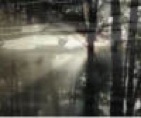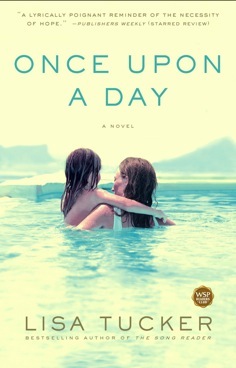

Q. Music and film both play a significant role in this book and in your previous titles, The Song Reader and Shout Down the Moon. Were you listening to or watching anything while writing this story that you found particularly interesting? How do music and film factor into your own life?
A. Music is a big part of my life because I sing jazz and my husband is a keyboard player/composer. We're always listening to something: jazz of course, but also classical, alternative, rap, you name it. That said, I can't listen to music while I'm writing because it makes it too hard to hear the characters. I can't watch as many movies while I'm writing either, though sometimes I do watch at the end of the day, because it can be a relief to lose myself in someone else's story. Of all the movies mentioned in the book, the one I love most is They Might Be Giants. I saw it when I was a child and maybe fifteen times since; it's one of my all time favorites. The movie (based on a play) is about a man who thinks he's Sherlock Holmes. The title comes from a reference to Don Quixote: "Of course [Quixote] carried it a bit too far. He thought that every windmill was a giant. That's insane. But thinking that they might be..." Don Quixote is obviously important to Once Upon a Day -- and to me; I used a quote in my first novel too: "Too much sanity may be madness. And maddest of all, to see life as it is and not as it should be." I love this.
Q. You seem to have a mixture of reverence and criticism for Hollywood. Is this true?
A. I know Charles feels this way, but I didn't agree with some of his criticisms. I enjoyed American Graffiti, for instance. It's always a little strange to hear one of the characters saying something that is against your own views. I did admire his speech when he won his screenwriting award: "The true obscenity is accepting the cynical view of what we're doing. Yes, movies are a business, but movies also represent the chance to communicate with the largest number of people in the history of the world...Let us be concerned about having something to say that enriches human life." Charles takes himself seriously (to put it mildly), but he also takes film seriously, and I like that. I feel the same way about books. The ones I love most are about all the serious things: love, family, how we should live, and what life really means.
Q. How does your own childhood compare to that of Dorothea and Jimmy's? What are your parenting philosophies? Do you respect the Charles Keenan style, or take a more laissez-faire approach with your own son?
A. My childhood was about as different from Dorothea and Jimmy's as it is possible to be. My son's is a little closer; he calls me "OP Mom," where OP stands for overprotective. I think wanting to keep your children safe is normal and understandable, though obviously Charles takes it too far. He's so focused on protecting them that he completely fails to prepare them for living in the real world. I've tried to do that for my son, though I'm sure I've make mistakes. You'll have to ask him about that part...
Q. Your narrative structure is rather unconventional, moving seamlessly from telling the story in first person through Dorothea to third person omniscient. How did you decide which scenes needed to be told from inside Dorothea's head and which needed a more detached vantage point?
A. Since most of the book is told from either Stephen's or Lucy's third person point of view, you could say that they are the main characters of the novel. Charles and Jimmy don't have their own chapters; Janice does but only as a commentator on Charles and Lucy, almost like the chorus in Greek plays. Which leaves Dorothea -- the only first person narrator in the bunch. Initially, I wanted Dorothea to be third person like everyone else, but whenever I tried to change her to third, it didn't work. I'm sure there's a reason for this, but it felt like I didn't decide, she did.
Q. The therapist Tracey introduces a psychological term many readers may not have heard before, "symbolic violence." Can you explain what this means and where you first heard it? Do you think it's a real issue in our society?
A. I first heard of "symbolic violence" in film class, when I was an undergraduate at Penn. Unlike "real" violence, "symbolic" violence could include everything from verbal threats to violence in movies and on TV. Psychologically, it's often used to intimidate and bully someone into submission. I think symbolic violence is a real issue in this society, of course, though I also understand Lucy's reaction to what the psychologist says. Once you've experienced real violence, you know there's a big difference between what Charles does by keeping her from having any movie roles and what truly horrible people do, like the men who attacked her.
Q. Which character's voice came most naturally to you as you were writing? Which one did you struggle with the most?
A. Stephen and Lucy came most naturally, probably because they're the characters most like me. Both are from Missouri, where I grew up; both have a straightforward way of thinking that makes me feel at home. I struggled the most with Dorothea's voice, since I had to be constantly aware of what she'd understand and what she wouldn't, given her odd upbringing.
Q. Dorothea carries a verse in her shoe, taken from the Faerie Queen: "Be bold, be bold, and every where Be Bold." Do you have any mementos or words of encouragement that you hold close to you?
A. Oh, yes, I clip out quotes constantly; you could even say I collect them. The one Dorothea puts in her shoe is something I came across in graduate school and used as inspiration to study for my exams. The two I have on my desk right now are: "It is in the knowledge of the genuine conditions of our lives that we must draw our strength to live and our reasons for living." (Simone de Beauvoir), and "Those whom books will hurt will not be proof against events. Events, not books, should be forbid." (Herman Melville)
Q. The classic Charlotte Bronte novel, Jane Eyre, pops up more than once in this story. What is your connection to the text? What ties were you attempting to make to your own novel?
A. As odd as this sounds, I didn't realize there were so many connections between Jane Eyre and Once Upon a Day until one of the blurbs pointed this out. Jane Eyre is very special to me, though. When I was in sixth grade, my teacher gave me a copy of the novel. It was the first book I didn't have to return to the library; I felt so privileged to own such a thick, grown-up-looking book. I read it so many times I started dreaming about Jane. I love the great passion in that novel, and I hope that's a connection to Once Upon a Day. The characters in Jane Eyre suffer so much, but they still believe in love and redemption. I tried to give my characters that belief, the same way I try to hold onto it myself.
Q. With an intrepid young heroine named Dorothea, venturing far from home, one immediately recalls the character "Dorothy" from the Wizard of Oz. Was this a symbolic naming?
A. The Wizard of Oz was part of my first novel; maybe it's the subtext for every American book that includes a journey to find your real home. I love that Dorothea's name made you think of Dorothy in Wizard. Now if only Charles had let them have a little dog. . .
Once Upon a Day
Q&A
Q. Do any of the characters in this book have a real-life inspiration? Please tell us how you arrived at these characters and how that led you to imagine their relationships.
A. Stephen was inspired by something that happened to me when I was in New York. I was on the way back to my hotel when the cab driver and I struck up a conversation. He told me that he was from Romania and had immigrated a decade before, that he loved New York, that he had two children, a wife, and a house in Queens. But then his voice became quiet as he told me that he was having some problems since 9/11. The World Trade Center attack had changed him, he said, and he didn't know what to do or how to change back. Then he looked in the rearview mirror and said flatly, "I've lost my hope." I didn't have a chance to say anything to him before we arrived at my hotel, where he picked up another fare and disappeared down the block. But I kept thinking about this man, wishing there was something I could have said. Wondering if there were any words powerful enough to help a person who'd lost his hope. All of this was still haunting me as I sat down and started writing the opening of the novel. As the story progressed, the other characters arrived the way they always do: as voices from another world with lots of secrets to tell me.








